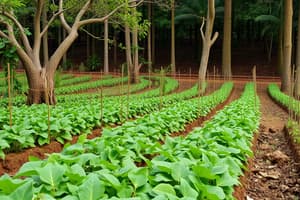Podcast
Questions and Answers
What is an agricultural system?
What is an agricultural system?
- A combination of resources for agricultural production
- A set of components interacting and interdependent to achieve a specific objective (correct)
- A group of unrelated components working towards different goals
- A collection of components operating independently
What has characterized agricultural development in the past century?
What has characterized agricultural development in the past century?
- Reduced demands for food, water, and energy
- Impressive production increases through increased use of land and fossil resources (correct)
- Sustainable resource management
- Decrease in technological innovations
What has contributed to the world's increasing complexity in recent years?
What has contributed to the world's increasing complexity in recent years?
- Climate change, growing population, demands for more food, water, and energy (correct)
- Expansion of arable land for food production
- Decreasing population growth
- Decreased demands for food, water, and energy
What are the negative trade-offs linked to agricultural progress?
What are the negative trade-offs linked to agricultural progress?
What will climate change lead to according to the text?
What will climate change lead to according to the text?
Flashcards are hidden until you start studying
Study Notes
Agricultural System
- An agricultural system refers to the integrated approach to food production, incorporating elements like crop cultivation, livestock rearing, and resource management.
- These systems are designed to meet human needs while maintaining environmental sustainability and economic viability.
Agricultural Development in the Past Century
- Characterized by significant technological advancements, such as mechanization and the use of synthetic fertilizers and pesticides.
- The Green Revolution increased crop yields, particularly in developing countries, through improved varieties and farming practices.
- Globalization influenced agricultural markets, enabling a shift towards cash crops rather than subsistence farming.
Increasing Complexity in Recent Years
- Growing interdependence of global supply chains has made food systems more complex.
- Urbanization and changing diets are shaping agricultural demands, requiring adaptability in production systems.
- Climate change effects, such as extreme weather events, have further complicated agricultural practices and food security.
Negative Trade-offs Linked to Agricultural Progress
- Environmental degradation due to excessive chemical use and monoculture practices can reduce biodiversity and soil health.
- Economic disparities arise; smallholder farmers may struggle to compete with large agribusinesses, leading to social inequality.
- Over-reliance on few crop varieties increases vulnerability to pests and diseases.
Climate Change Impact
- Climate change is expected to disrupt agricultural productivity, leading to decreased yields in some regions.
- Shifts in climatic patterns may alter the distribution of crops and the viability of certain farming practices.
- Increased frequency of extreme weather events could threaten food security and livelihoods for vulnerable populations.
Studying That Suits You
Use AI to generate personalized quizzes and flashcards to suit your learning preferences.




